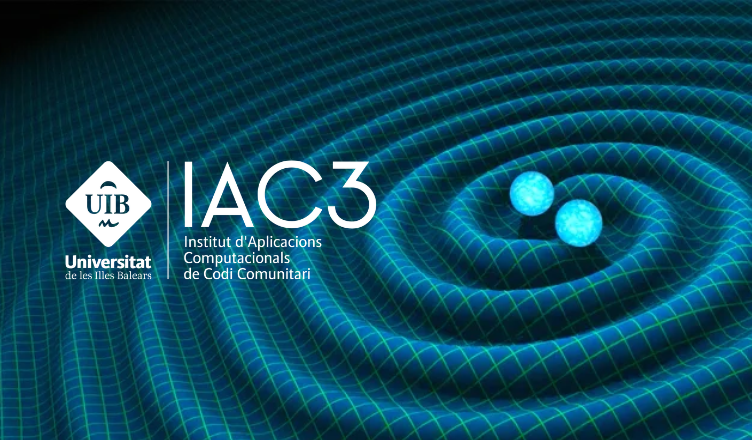The University of the Balearic Islands (UIB), through the Institute of Applied Computing and Community Code (IAC3), plays a key role in the Spanish Network of Gravitational Wave Physics (REDONGRA), a national initiative that will consolidate and expand Spain’s leadership in gravitational wave science. REDONGRA, coordinated by Carlos Fernández Sopuerta, senior researcher at the Institute of Space Sciences (ICE-CSIC), has received substantial support from the 2024 call Redes de Investigación of the Spanish Ministry of Science, Innovation and Universities. This funding recognises the Spanish Network of Gravitational Wave Physics strategic importance in positioning Spain at the forefront of the international gravitational wave community.
REDONGRA aims to both coordinate Spain’s participation in gravitational wave research and prepare the next generation of scientists and infrastructure for upcoming large-scale missions such as the ESA-led Laser Interferometer Space Antenna (LISA) and the ground-based Einstein Telescope. The network will design a strategic roadmap to maximize Spain’s contributions to these missions, enabling deeper insights into the nature of gravity and the universe.
The collaboration unites 20 leading research institutions across Spain already active in international projects. Together with ICE-CSIC and other partners, the UIB is one of the core institutions driving REDONGRA’s scientific agenda. The UIB has been a longstanding contributor to this field through the IAC3. The IAC3 GRAVITY group is actively involved in major international collaborations such as LIGO, the Einstein Telescope, and LISA, contributing both theoretical and computational expertise. Furthermore, the Gravitational Astronomy–LISA group at ICE-CSIC, where Sascha Husa, along with Carlos F. Sopuerta and Miquel Nofrarias, has contributed significantly to the LISA Pathfinder mission and is now leading efforts in data analysis and instrumentation for the upcoming LISA mission. LISA, expected to launch in 2035, will be the first space-based gravitational wave observatory. With a triangular formation of three spacecraft spaced 2.5 million kilometers apart, it will detect low-frequency gravitational waves from cosmic events otherwise inaccessible from Earth.
The UIB participation in REDONGRA is lead by Dr. David Keitel as UIB node coordinator and steering committee member, the GRAVITY group leader Prof. Alicia M. Sintes, and Dr. Sascha Husa who as UIB collaborator is also a REDONGRA steering committee member via ICE-CSIC. The GRAVITY group also includes as faculty members Prof. Jaume Carot, Dr. Xisco Jiménez Forteza, Dr. Antoni Ramos Buades and Dr. Pep Covas as well as a total of over 30 group members including postdoctoral researchers, doctoral and master students.
REDONGRA activities officially began in May 2025. Among the key events planned is the 10th anniversary of the first gravitational wave detection, to be held on 15–17 September in Palma, including a two-day international scientific meeting at the Auditorium of the ParcBit and a public event at CaixaForum on September 17: https://grg.uib.es/10thAnniversaryGW150914/. This high-profile event will bring together leading researchers from across Spain and beyond to celebrate a decade of discoveries and to shape the future of the field. Other major REDONGRA events include the Iberian Gravitational Waves Meeting (23–25 June), the second LISA Spain Meeting (23–24 October, CSIC, Madrid) and the 10th anniversary of the LISA Pathfinder Launch, (3 December, ICE-CSIC, Barcelona)
In the near future, REDONGRA will also launch a dedicated school on gravitational wave physics, providing comprehensive training for graduate students entering this rapidly growing field.
This new phase of REDONGRA builds upon earlier efforts, expanding its vision and reach. By aligning Spain’s top-tier research institutions, including the UIB and the IAC3, and its partners are helping to position gravitational wave science as a national scientific priority.
About REDONGRA
The REDONGRA network includes: ICE-CSIC, CIEMAT, IAA-CSIC, IAC, ICCUB, IEM-CSIC, IFAE, IFCA-CSIC/UC, IFIC-CSIC/UV, IFT-CSIC/UAM, IGFAE, UA, UCA, UGR, UIB, UPC, UPM, UPV/EHU, USAL, and UV.











